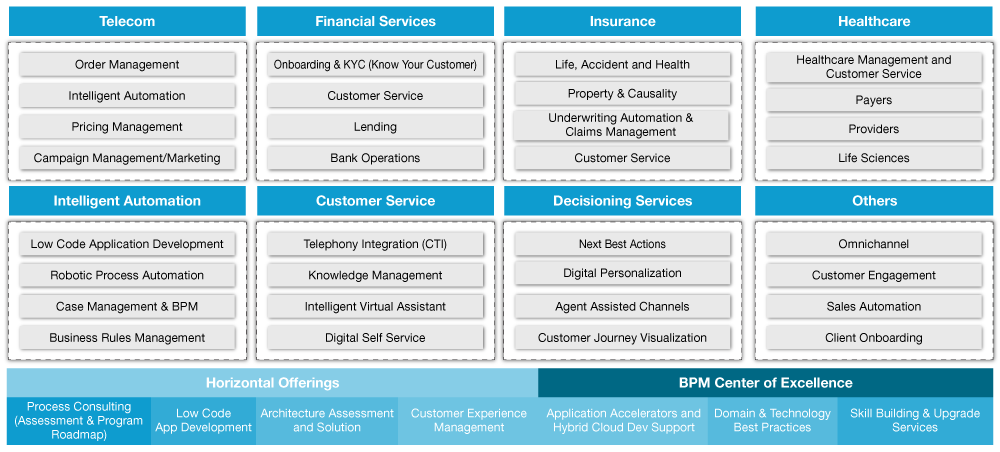ALIGN AND AUTOMATE BUSINESS PROCESSES
Improve efficiency, flexibility, and capability to adapt to changing conditions
Mphasis has over 19 years of experience in business process automation and providing end-to-end services, from consulting to cloud enablement. Mphasis’ Business Process Management (BPM) practice has over 400 skilled professionals and various leading, intelligent BPM products and productivity solutions to help scale BPM applications to enterprise level. We also have strategic global alliances with leading BPM product providers like PEGA, Appian, IBM BPM and Camunda.
Our Business Process Services leverage best practices to orchestrate workflows in the client technology landscape, along with domain-driven and AI-ML enabled Process Optimization. We provide recommendations to implement the intelligent process in an optimal way.

We have four primary market services: Implementation, Support, Consulting/Advisory, and Center of Excellence. .

Our BPM COE Consulting Services help clients scale their Intelligent Process Automation programs and accelerate BPM applications automation journey using Robotics. We create and expand the pipeline of potential automation opportunities and validate them for technology feasibility and business value.
The COE training and lab sessions enable users to collaborate to implement built-in design best practices and build a Continuous Integration/Continuous Delivery pipeline with automation tools.
Our teams leverage the following accelerators and frameworks that improve productivity and accelerate BPM implementations.
BPM Process Assessment Framework (BPAF) - Enables smooth process automation assessment, recommends a roadmap and ROI analysis. It is built on industry best practices, proven methodologies, industry-standard checklists, and artifacts. In addition, standardized tools, processes, and governance ensure effectiveness.
BPM Enterprise Assets Foundation Framework - Helps our customers to implement business process management solutions rapidly. It reduces the turnaround time and increases debugging productivity by 20 percent. Automation of deployment process is 30 percent faster than the normal process.
We also have upgrade toolkits that speed up migrations of BPM tools.

Strong experience in insurance and banking domains.

Excellent pool of senior architects and leads.

Expertise in legacy migration and upgrades.

Re-usable assets, frameworks, POCs, and Agile methodologies.

Excellent experience in process discovery/mapping.

Agile delivery for fast results.
Mphasis Pega Quality Assistant
Mphasis Pega Quality Assistant provides organizations with accurate rule tracking, code review tracking, and auditing and monitoring of vital parameters of any Pega release during development - so you can fix issues before they become problems. You can also use the assistant to register additional test recommendations from the technical team and track shared rules in case of rollback and retrofitting scenarios.
Key Features
Pega rule and warning compliance
Receive warnings around all rules for release
Mphasis Pega DevOps Utility
Take advantage of an easy-to-use UI to qualify and track deployment of all your user stories. Mphasis Pega DevOps Utility provides you with a Pega deployment UI that has a Jenkins-based pipeline - all so you can configure your DevOps environment with ease.
Use Mphasis Pega DevOps Utility to configure your DevOps environment and complete the following tasks:
Pega Marketplace Listing
Appian Automated Code Analyzer
Mphasis’ accelerator Appian Automated Code Analyzer, built with the Appian BPM tool, is an automated code analyzer that performs 90+ auto checks across 17 objects. This includes additional 60% features when compared to health check best practice report. Featuring an interactive user interface, the analyzer offers multiple reporting options. The Result Grid gives a comprehensive view of all the problems in the code, and the Visual Reports help track the issues. The analyzer helps business in -
Appian Marketplace Listing
Pega Enterprise Assets Foundation Framework
BRMS Evaluation Framework